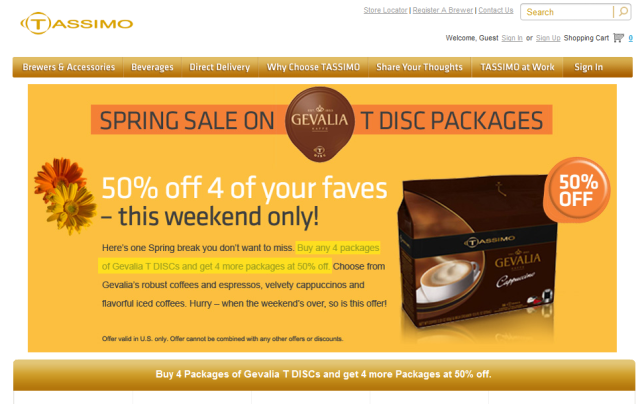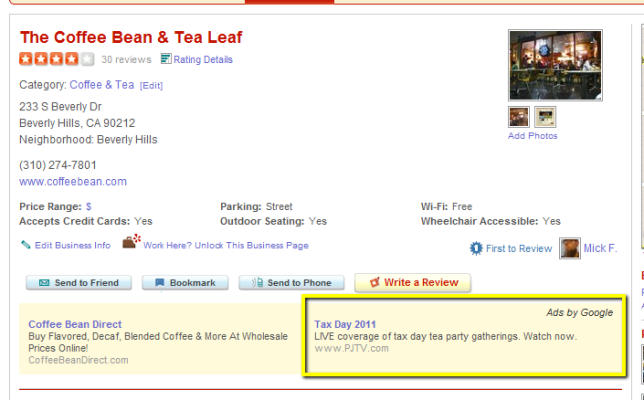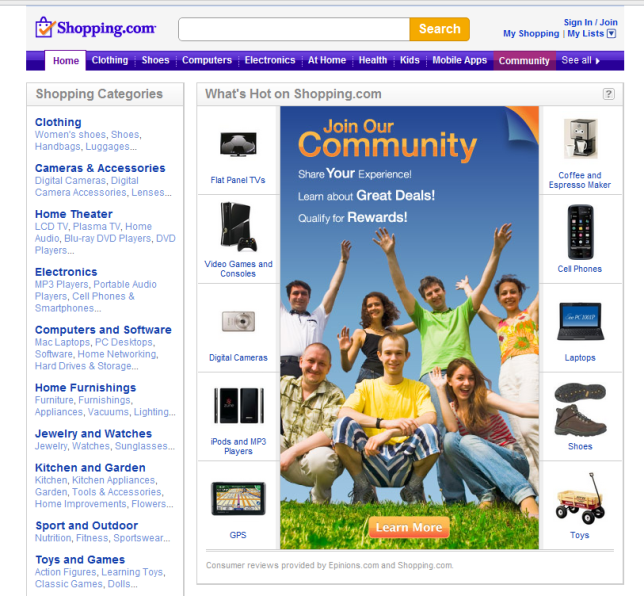 Last week I wrote a post questioning a deal from Startups.com. The offer was for 45 minutes of marketing consulting for $39, which represented “98% off” the regular rate. As I noted in the post:
Last week I wrote a post questioning a deal from Startups.com. The offer was for 45 minutes of marketing consulting for $39, which represented “98% off” the regular rate. As I noted in the post:
Now I wasn’t a math major in college (and actually, I typically got a lot of C’s in math in high school), but if 45 minutes for $39 is 98%, that means the actual cost would normally be around $2700/hr. Assuming a 200 day work year, that works out to an annual rate of $5.4M. I’m pretty sure you could combine the annual salaries of the CMOs of Amazon, Google, eBay, and Microsoft and their salaries wouldn’t exceed $5.4M.
Josh, the founder of the marketing consultancy in this deal, recently responded to my post, which you can read here. To summarize his comment, he notes that he actually spends far more than 45 minutes on every client (thus reducing the per hour cost from $2700 to closer to $333) and also adds that he provides tremendous value, thereby justifying the cost of his service. He has also written a blog post on his own site about the value of marketing services in general.
My post today is not really a response to Josh, but I’ll add two quick points (speaking directly to Josh here!). First, I still believe the offer by Startups.com was disingenuous, because it implied that the $39 was for 45 minutes of time at 98% off. So the fact that you actually spend a lot more time on each client (which I commend you for) doesn’t actually make the advertisement any more factual. If anything, you should have said $39 for three hours of consulting, or something like that! Not blaming you here, mostly criticizing Startups.com. Second, I am sure that you do add a lot of value through your services. I don’t know you personally, but I do know a member of your team and I know him to be a quality, smart guy.
A more interesting issue here, however, is determining the true value of marketing services. As Josh writes in his post:
Ultimately, there is no such thing as the RIGHT price, especially in services businesses, but there is the right match for you. Expense is relative; performance is everything. There is no “real” price tag for the time of an online marketing consult.
I disagree with this point. I would argue that service business pricing is based on four quantifiable values: scarcity, value, cost, and risk. Let’s go through each of these individually.
Scarcity
Scarcity in an economic sense means that there is more demand than there is supply. Scarcity causes commodity prices to increase, hot Christmas gifts to get sold above retail on eBay, and top experts to charge hundreds or thousands of dollars for their services.
From a supply perspective, the market for marketing services happens to be an inefficient market, meaning that not all buyers and sellers are transparent to each other in one giant marketplace. Most buyers of marketing services don’t know all of their choices; indeed, they usually only know what they can discover through search engines, webinars, or word-of-mouth. This leads to information asymmetry, almost on a buyer-by-buyer basis. One buyer may have a list of 100 marketing consultants, and can thus get a very good sense of the true value of a consultant’s time. Another may only have access to one or two consultants (for example, someone who’s only exposure to the marketplace is an email from Startups.com). The greater the supply scarcity (again caused by information asymmetry), the greater the value of the services.
From a demand perspective, scarcity exists because marketing service providers can only handle a certain number of clients at once. As more potential clients ask for a consultant’s time, the consultant can raise his rate. Hence, a consultant already working 40 hours a week might be approached by a new client and decide that he’ll only take on this client if he is paid double his current rate, but a consultant with no work at all places much lower value on his time, and will probably work for a bargain price, just to get some income.
Suffice to say, it is up to the service provider to understand the supply and demand equilibrium and price his services accordingly. When I first started my agency in 2008, I charged a minimum fee of $500/month. I had no clients and every dollar mattered. Today, I charge a minimum fee of $5000/month. This pricing is due in large part to scarcity – there are too many clients that want to work with my team (always a great problem to have), so I have to be more selective about who we bring into the fold. At some point, if the supply of potential clients continues to grow, I may increase this further. If the supply dwindles, I would reduce it.
One final point about scarcity is the concept of substitute products. At some point, if scarcity drives the price of marketing consultants too high, buyers will start to consider bringing a marketing person on full-time, in-house. The tipping point for every buyer varies (in SEM, it is often correlated to the amount of spend under management, and hence the fee for this spend).
A rule of thumb someone gave me when I first started consulting was to charge double what my hourly rate would be if I was in-house. This dollar amount takes into account the fact that as a consultant you pay for your own benefits and you are often not fully booked a 40 hour week. Given that the average American works 2000 hours a year (50 weeks X 40 hours), you can come up with a pretty good proxy for your hourly rate by figuring out what your potential clients are paying for F/T in-house team members. Hence, if a client would hire you for $100,000, that works out to $50/hr, which means that you should charge that client $100. If you wanted to charge $200, the substitute product rule would probably come into effect and, assuming there are decent candidates willing to work in-house, the client would probably go the in-house route.
Value
Value refers to the economic impact you provide to a client. The more the impact, the more you get paid. Why do hedge fund managers make millions of dollars while strawberry pickers get $10/hr if they are lucky? In part due to scarcity (most hedge fund managers could pick strawberries, most strawberry pickers couldn’t be hedge fund managers), but also straight economic output.
In the marketing services world, especially the online marketing world, value can be clearly quantified. One agency might drive 20% ROI on your campaigns and another might drive 5000%. Apples to apples comparisons can be quite easy to obtain. Not surprisingly, the greater the value a service provider drives, the greater the demand for that provider’s services, and the greater the service provider can charge. The fact that my agency has increased our minimum fees by 10X in just three years is in large part due to the fact that we drive immense value to our clients, especially compared to many other agencies!
Cost
Different marketing service providers have different cost structures. Some companies hire independent contractors overseas to do all their work at $5/hr. Others hire 10+ year veterans, have fancy offices, sophisticated technology, and generally high overhead. It goes without saying that the rate you charge clients has to consider the cost to service those clients!
Risk
Lastly, there’s the notion of risk. Some marketing service providers assume a lot of risk when taking on a new client. For example, a performance marketing company might not charge their client anything unless they hit a certain cost per sale goal. Traditional agencies take no risk – they require an upfront retainer and get paid regardless of the results of their work (within reason). As a general rule, the greater the risk, the greater the upside.
To provide a hypothetical around this, let’s say that Widgets.com sells blue widgets. If they sell a widget for $20, they make $10 of profit. A performance agency offers them this deal: we’ll market your widgets for you and you only have to pay us if we get sales for less than $10 each. Widgets.com agrees and the agency sells 50,000 widgets with a marketing cost of $4 each, which means that the agency gets $6 ($10-$4) times 50,000 sales, or $300,000. A traditional agency has the exact same performance, but elects to charge Widgets.com 10% of spend regardless of whether they hit the $10 per sale metric. In this case, since they spent $200,000 on media, they end up charging Widgets.com $20,000 (10% of $200K).
Putting it All Together
You can charge whatever you want for your marketing services, but to really grow a meaningful business, you need to take the above factors into account. It’s true that you might occasionally find a client who is willing to pay you way more than scarcity demands, has little concern for whether you provide value, doesn’t care about your cost structure and is willing to take on all the risk, but that is more of a lottery ticket approach to business than a sound business plan.
 About six years ago I wrote my first blog post on Blogation. You can read it here. I’ve had a lot of fun writing this blog – almost 500 posts in total. But as they say, “Things change, people change, hairstyles change, interest rates fluctuate.” When I started this blog, I was an employee of a fast-growing (and equally fast-impoding) dot com. Today, I’m the founder of a fast-growing (and hopefully not imploding) PPC agency. That means more responsibility and thus less time to write blog posts. Oh, and it is also probably worth noting that since I started the blog in 2005, I now have a wonderful wife and two cute kids under 3.5. Even less time to blog.
About six years ago I wrote my first blog post on Blogation. You can read it here. I’ve had a lot of fun writing this blog – almost 500 posts in total. But as they say, “Things change, people change, hairstyles change, interest rates fluctuate.” When I started this blog, I was an employee of a fast-growing (and equally fast-impoding) dot com. Today, I’m the founder of a fast-growing (and hopefully not imploding) PPC agency. That means more responsibility and thus less time to write blog posts. Oh, and it is also probably worth noting that since I started the blog in 2005, I now have a wonderful wife and two cute kids under 3.5. Even less time to blog.













 Google likes to brag that YouTube is the world’s second biggest search engine (in your face Bing!), and when you look at it that way, you realize the magnitude of the opportunity on YouTube. When I think about my own online behavior, I probably watch at least 15-20 YouTube videos every week, and I suspect most people fall into this camp. And yet, of the 40 clients with which we are currently working, only a handful have given anything more than lip service to creating a marketing strategy around YouTube.
Google likes to brag that YouTube is the world’s second biggest search engine (in your face Bing!), and when you look at it that way, you realize the magnitude of the opportunity on YouTube. When I think about my own online behavior, I probably watch at least 15-20 YouTube videos every week, and I suspect most people fall into this camp. And yet, of the 40 clients with which we are currently working, only a handful have given anything more than lip service to creating a marketing strategy around YouTube.











Comment Spam for the Sake of Spam, Not Links?
I don’t get it. I sometimes get comments on this blog that are totally ridiculous that then have a link to best-underwater-basketweaving-in-india.com or something – clearly a way to try to get in-bound links via leaving comments on a blog.
Over the last few days, however, I’ve been getting 3-4 comments a day that are totally inane, but then link to Bing, Yahoo, or Google. Here are some of the great “comments” I’ve gotten:
Why would someone bother to add comment spam without an attempt at an inbound link? My only theory right now is that this is some way of getting around WordPress’ automatic spam detection – if I accept these comments, the commenter gets ‘positive points’ for not being a spammer. At some point, he gets enough credit with WordPress that he can massively spam lots of blogs and the spam filter won’t catch him.
Beyond that theory, I’m stumped. Any ideas?
Posted by davidzhawk on April 13, 2011 in Uncategorized
Tags: comment spam